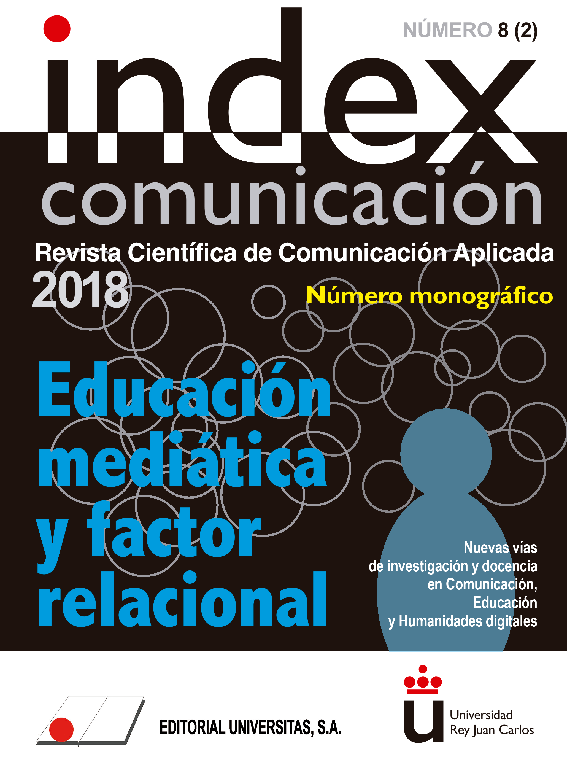Integenerational radio in the school: a proposal to active ageing
Keywords:
intergenerational program, community education, educational radio, educational innovation, population ageing, intangible cultural heritage,Abstract
Schools must generate answers to social challenge that the ageing population raises. The main objective of this research is to evaluate the benefits that could involve the implementation of a intergenerational program, focused on radio, in educational centers.These benefits keep relation with intergenerational learning, active ageing and the safeguard of intangible cultural heritage. In order to develope this investigation, we have approached the design, development and evaluation of a intergenerational program mediated by radio. It took place in a classroom of primary education from CPI Virxe da Cela de Monfero (A Coruña). According with it, we have selected a program evaluation methodology. In addition, we have used interviews and participant observation as a method. This labour has allowed us to show how the synergy between intergenerational programs and radio can increase benefits related to the breaking of stereotypes, the betting on lifelong learning or social inclusion. All of them aspects enable us to establish a debate about responsibility and the way in which the school can contribute to the generation of a society for all ages.
Metrics
References
Arias, E.; Gómez, S. y Rubio, B. (2008). La radio como herramienta de aprendizaje: «Miradas», una experiencia de radio intergeneracional. Papeles Salmantinos de Educación, 10. Salamanca: Universidad Pontificia. Recuperado desde: https://bit.ly/2qrEJlZ
Bernard, M. y Ellis, S. (2004). How do you know that intergenerational practice works? A guide to getting started on evaluating Intergenerational Practice. Hartshill: The Beth Johnson Foundation. Recuperado desde: https://bit.ly/2qnKWQQ
Cohen, L. y Manion, L. (1999). Métodos de Investigación Educativa. Madrid: La Muralla.
Comisión Europea (2005). Frente a los cambios demográficos, una nueva solidaridad entre generaciones. Libro verde. Luxemburgo: Oficina de Publicaciones Oficiales de las Comunidades Europeas.
DeWalt, K. y DeWalt, B. (2002). Participant observation: a guide for fieldworkers. WalnutCreek: AltaMira Press.
Eurobarometer. Flash FB Series nº 269. Intergenerational solidarity. Marzo 2009. Recuperado desde: https://bit.ly/2GVhhop
Flick, U. (2011). Las entrevistas en investigación cualitativa. Madrid: Morata.
Goikoetxea, E. y Pascual, G. (2002). Aprendizaje cooperativo: Bases teóricas y hallazgos empíricos que explican su eficacia. Revista Educación XXI, 5, 227-247.
González, T. (1998). La entrevista en la investigación. Murcia: Mimeo.
Harper, S. y Hamblin, K. (2014). International Handbook on Ageing and Public Policy. Cheltenham: Edward Elgar Publishing.
Herrera, S. (2003). Rasgos diferenciales de la radio como medio de comunicación. Revista de Comunicación, 1, 25-40.
International Longevity Centre Brazil (2015). Envejecimiento activo. Un marco político ante la revolución de la longevidad. Río de Janeiro: ILC-Brazil.
Instituto de Mayores y Servicios Sociales (2011). Envejecimiento Activo. Libro Blanco. Madrid: Ministerio de Sanidad, Política Social e Igualdad. Recuperado desde: https://bit.ly/1dhEzDs
Instituto Nacional de Estadística (2016, 20 de octubre). Proyecciones de población 2016-2066 [Nota de prensa]. Recuperado desde: http://www.ine.es/prensa/np994.pdf
Johnson, D.; Johnson, R. y Holubec, E. (1999). El aprendizaje cooperativo en el aula. (Traductora Vitale, G.). Barcelona: Paidós. (1994).
Jover, T. (2013). El poder de la educación para transformar la sociedad. En: B. Roman y G. De Castro (Coords.), Cambio social y cooperación en el siglo XXI [Vol.2]. El reto de la equidad dentro de los límites económicos (pp. 82-94). Barcelona:Icaria editorial. Recuperado desde: https://bit.ly/2xHw5Sg
Kotre, J. (1995). Generative outcome. Journal of Aging Studies, 9, 33-41.
Kuehne,V. (2005). Making the difference? How Intergenerational Programs Help Children and Families? Elder as Resources: Intergenerational Strategies Series. Baltimore: Annie E. Casey Foundation.
Kvale, S. (2011). Las entrevistas en Investigación Cualitativa. Madrid: Morata.
Lorenzo, L. (2010). Consecuencias del envejecimiento de la población: el futuro de las pensiones. Madrid: Instituto Nacional de Estadística. Recuperado desde: https://bit.ly/2pWZK9d
Martínez, C. (2017). Evaluación de programas. Madrid: UNED.
Miles, M. y Huberman, A. (1994). Qualitative Data Análysis. Beverly Hills: Sage Publications.
Organización Mundial de la Salud. (2002). Envejecimiento Activo. Un marco político. Revista Española de geriatría y gerontología, 37, 74-105.
Pascual, B.; Gomila, A. y Pozo, R. (2016). Aplicaciones Escolares de los programas intergeneracionales. En: C. Orte y M. Vives (Eds.). Compartir la infancia. Proyectos Intergeneracionales en las escuelas (pp.47-62). Barcelona: Octaedro.
Pinazo, S. y Sánchez, M. (2005). Gerontología. Actualización, innovación y propuestas. Madrid: Pearson Prentice-Hall. Recuperado de: https://bit.ly/2GQWbr8
Sánchez, M. (dir.) (2007). La evaluación de los programas intergeneracionales. Madrid: IMSERSO. Recuperado desde: https://bit.ly/2INy0KR
Sánchez, M.; Kaplan, M. y Carreras, J. (2010). Programas intergeneracionales. Guía introductoria. Madrid: IMSERSO.
Sánchez, M.; Kaplan, M. y Bradley, L. (2015). Usando la tecnología para conectar las generaciones: consideraciones sobre forma y función. Comunicar, 23, (45), 96-104.
Zaidi, A.; Gasior, K. y Sidorenko, A. (2010). Intergenerational Solidarity: Policy Challenges and Societal Responses. Recuperado desde: https://bit.ly/2GOqQt8
Published
How to Cite
Issue
Section
License
Authors who submit to this journal agree to the following terms:
Authors retain copyright and ensure the magazine's right to be the first publication of the work as licensed under a Creative Commons Attribution-NoComercial 4.0 International License that allows others to share the work with an acknowledgment of authorship of the work and the initial publication in this magazine, with no commercial purpose.
Authors can establish separate additional agreements for non-exclusive distribution of the version of the work published in the magazine (for example, to an institutional repository or publish it in a book), with an acknowledgment of its initial publication in this journal.
It allows and authors are encouraged to disseminate their work electronically (eg, in institutional repositories or on their own website) prior to and during the submission process, as it can lead to productive exchanges, as well as a citation more early and most of the published work (See The Effect of Open Access).















